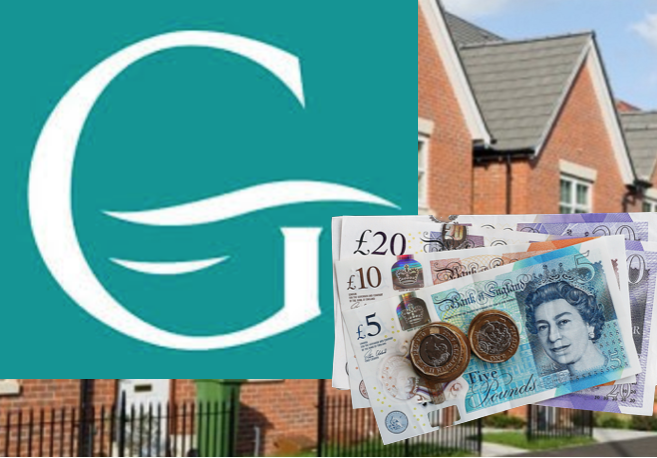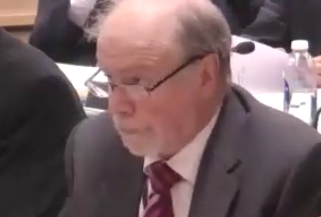 Abraham Lincoln
If given the truth, the people can be depended upon to meet any national crisis...
Abraham Lincoln
If given the truth, the people can be depended upon to meet any national crisis...
 Guildford news...
for Guildford people, brought to you by Guildford reporters - Guildford's own news service
Guildford news...
for Guildford people, brought to you by Guildford reporters - Guildford's own news service
Why Council Had to Pay £2.3m Held For Council Housing to Government
Published on: 19 Feb, 2021
Updated on: 19 Feb, 2021
The money came from the sale of council houses under the controversial right-to-buy scheme. The blunder was revealed by Nigel Manning (Con, Ash Vale), former lead councillor for finance, during the budget debate on February 10.
Today (February 19) managing director James Whiteman apologised in a statement indicating council officers, not councillors, were responsible. He said: “We are sorry we have not been able to spend the money within the timeframe despite our best intentions and we are doing what we can to mitigate this loss.”
That was followed by a joint statement from coalition leaders Joss Bigmore (R4GV) and Caroline Reeves (Lib Dem). They said: “…we apologise unreservedly on behalf of the council”.
But they pointed out that more than half of this money had to be returned in 2019 “due to inaction” during the Conservative administration of Cllrs Paul Spooner and Matt Furniss.
They said they intend to investigate how this was kept hidden from Executive members until now.
During the budget debate, Cllr Manning said: “The government allows the council to keep the right-to-buy receipts to allow this money to be re-invested in new housing stock. There are conditions attaching to this in so far as it must be reinvested within three years…
“When I was lead member for finance and assets I asked a frequent question, which was, ‘Have we enough HRA [housing revenue account] new builds… to use up the right-to-buy funds, to avoid any payback to the government?’
“What I find very concerning is that there are so many on the housing list, awaiting council housing, that last year this new council run by a Lib Dem and R4GV coalition had to repay £2.334 million, including interest, back to the government.
“I must implore the current administration get to grips with portfolio in this regard and ensure there is a clear schedule of right-to-buy receipts, with each amount expensed.”
Former Conservative councillor Phillip Brooker was lead member for housing and homelessness until 2019, when he lost his Merrow seat.
He said: “In the Lib Dem manifesto for the 2019 GBC local elections, they promised to build 3,000 new council houses in the next 10 years. As we are now two years into their term, 600 should now have been delivered.
“I have been asking questions (see letters in The Guildford Dragon dated February 6 and February 8, 2021), and otherwise trying to find out exactly how many have been delivered. The deafening silence makes me think matters are worse than I thought.
“And now we find out that, not only are houses not being delivered, but the Lib Dem/R4GV council have had to pay central government £2,344,298.95 of council taxpayer’s money for failing to build council houses.
“When I was the lead member, I had implemented a plan to build approximately 110 council houses per annum, all on council-owned brownfield land, and on sites which had been identified. What has happened to this plan?
“When will the Lib Dem/R4GV council admit their election promises were fantasy, their record of building council houses, abysmal and that they are totally out of their depth in managing the council’s finances.”
But today’s statement from Cllrs Bigmore and Reeves is yet more revealing. “Former councillor Brooker’s contribution to this debate is confusing [because more than] half this money (£1.2 million plus interest) was returned in 2019 due to inaction when he was lead member for housing …
“There are clearly fundamental and longstanding problems with the council’s reporting around this issue and, as a consequence, funds that could have been spent on housing were not, and we apologise unreservedly on behalf of the council.
“We assume a similar apology will be forthcoming from the local Conservatives for their actions (or lack of) prior to the last election.
“The right-to-buy policy is complex and spending the returns is not as simple as it sounds.
“We can use the receipts for only a maximum of 30% of a new purchase or development, so of the £2 million we returned we would have needed to add about £4.5 million of funding from other sources to actually unlock spending it.
“It is perhaps important to point out that we have received more than £50 million of funding from the Housing Infrastructure Fund for the Weyside Urban Village, agreed under this administration. We also expect further contributions.
“In no way does this excuse the issue of returning this [£2.3 million] … but it’s clear we have received more from the government than we have paid back to support our housebuilding programme.
“We will ensure our procedures are reviewed immediately such that we can manage this appropriately in the future.
“We have always said the council under this administration will be open and honest about its shortcomings and we will work hard to continually improve ourselves.”
The remainder of Mr Whiteman’s statement today fully backed the R4GV/Lib Dem position, adding: “Since 2012, councils have been able to keep all of their right-to-buy income providing it is spent on new affordable housing or related transaction costs within three years.
“As an incentive to replace housing lost through right-to-buy, the government ask for unused RTB income within the three-year period to be repaid at an interest rate of 4.75%. This is income from the sale of houses not council tax collected from residents.
“Our right-to-buy income and expenditure is closely monitored and included in the budget. We have identified new-build housing schemes and properties to acquire to spend the income on, but in the past two years it was not possible to spend all of the income without building more new houses than we were able to as part of our existing programme.
“This is because we are allowed to fund only 30% of any replacement housing from the RTB Income.
“We have to fund the remaining 70% of the cost of replacement housing ourselves. For 2019/20 we had to pay back £1,993,537 income with £387,910 interest as we were unable to spend it.
“But we would have had to have spent a further £6.6 million on replacement housing to have avoided that.
“During 2020-21, we have been granted an extension to the time period within which RTB receipts can be spent but we anticipate there is still a risk we may need to return more receipts to government.
“We are finding the time frame of three years within which we need to spend the money is difficult given that it typically takes one to two years to design a scheme and obtain planning permission and building consent for it.
“We are sorry we have not been able to spend the money within the timeframe despite our best intentions and we are doing what we can to mitigate this loss.
“But we are not alone. There is national concern that replacement housing is not being built fast enough and the Local Government Association has recommended to government that they could help with this by extending the time limit to spend the income from three to five years.
“The LGA continues to argue for councils to have maximum flexibilities to build; for instance the freedom to borrow against its housing assets, retain 100 per cent of receipts generated from all sales, and set rules such as discounts in line with local pressures. The government has not yet published the findings of its 2018 consultation on the subject.
“We are sorry we were unable to build new homes faster to spend the income but we aren’t alone and other councils also struggle to do this.
“To be more transparent with the monitoring of this issue, and to ensure the financial position is reported clearly and transparently, we will revise the information we include on the housing revenue account in our regular financial reports to our corporate governance and standards committee.
“We regret that our housing development programme has not progressed at the pace we had intended but, having already built new affordable houses at Ladymead, Southway and Great Goodwin Drive since 2019, we are working hard to ensure more new housing can be built as quickly as possible.”
Recent Articles
- Guildford Institute’s Crowdfunding Project for Accessible Toilet in its New Community and Wellbeing Centre
- Letter: Guildford – Another Opportunity Missed?
- Letter: GBC’s Corporate Strategy – Where Is the Ambition?
- My Memories of John Mayall at a Ground-breaking Gig in Guildford Nearly Six Decades Ago
- Westborough HMO Plans ‘Losing the Heart of the Street’ Says Resident
- College Invests to Boost Surrey’s Economy and Close Digital Skills Gap
- Community Lottery Brings Big Wins for Local Charities
- GBC Housing Plan Promises ‘A Vibrant Urban Neighbourhood’ Near Town Centre
- Hospital Pillows ‘Shortage’ at the Royal Surrey
- Updated: Caravans Set Up Camp at Ash Manor School


Search in Site
Media Gallery
Dragon Interview: Local Artist Leaves Her Mark At One of England’s Most Historic Buildings
January 21, 2023 / No Comment / Read MoreDragon Interview: Lib Dem Planning Chair: ‘Current Policy Doesn’t Work for Local People’
January 19, 2023 / No Comment / Read MoreA3 Tunnel in Guildford ‘Necessary’ for New Homes, Says Guildford’s MP
January 10, 2023 / No Comment / Read More‘Madness’ for London Road Scheme to Go Ahead Against ‘Huge Opposition’, Says SCC Leader
January 6, 2023 / No Comment / Read MoreCouncillor’s Son Starts Campaign for More Consultation on North Street Plan
December 30, 2022 / No Comment / Read MoreCounty Council Climbs Down Over London Road Works – Further ‘Engagement’ Period Announced
December 14, 2022 / No Comment / Read MoreDragon Interview: GBC Reaction to the Government’s Expected Decision to Relax Housing Targets
December 7, 2022 / No Comment / Read MoreHow Can Our Town Centre Businesses Recover? Watch the Shop Front Debate
May 18, 2020 / No Comment / Read More














Recent Comments